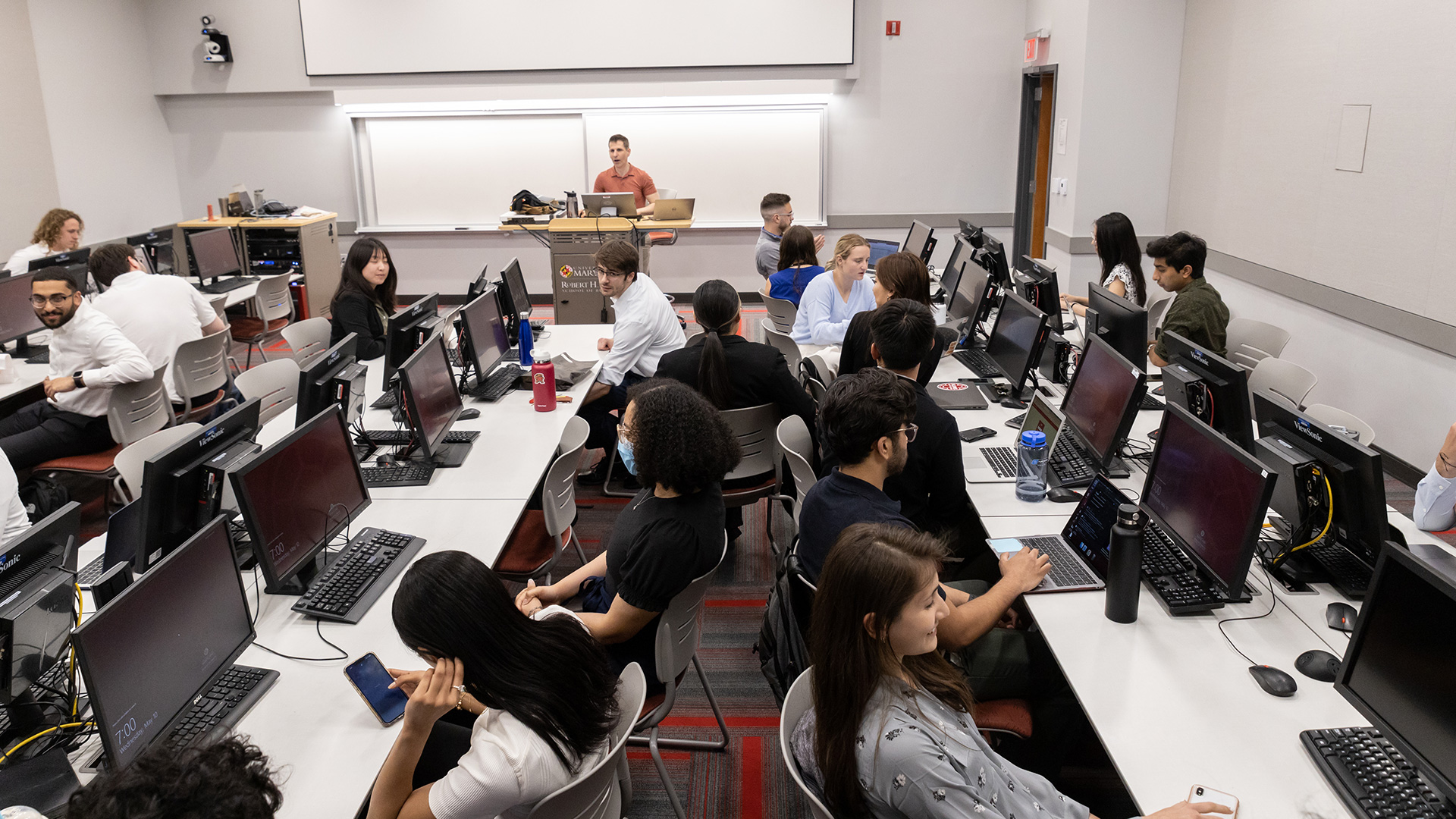
Students majoring in Information Systems got the opportunity to use what they’d learned throughout the undergraduate program in a culminating experiential learning senior capstone course where they built web solutions for small local businesses and worked with professionals and alumni from Deloitte and KPMG.
“You can’t beat the learning that happens by doing,” said John Bono, associate clinical professor and co-director of the Smith Analytics Consortium, who teaches the semester-long capstone course, BMGT407. “Students applied what they learned in all of their information systems courses to solve a real business problem for a real client. They gained insights into the complexities and challenges of implementing information systems.”
Students formed teams and were required to find their own clients. Many worked with small businesses – some student-run – including restaurants, bakeries, a car dealership, a clothing store, a pest management company, a tax preparation business, and an event promotions firm.
Teams had to go through a complete information systems development process with their clients – everything from defining a business problem or opportunity through implementing a working prototype. The systems they built – things like online customer loyalty portals and online ordering platforms – had to function well for both external users and for the managers of the business. Many of the systems incorporated reporting and dashboards showcasing their analytics skills.
Students got a lot out of the course.
“The knowledge gained and lessons learned from BMGT407 were invaluable, as we were tasked with applying our information systems skills to real-world scenarios,” said Nichelle Columba ’23. “I learned that the answer to almost every question is ‘it depends.’ There is no one ‘right’ answer to any problem; rather the process is iterative and requires thinking outside of the box.”
“The course itself provides excellent material for interviews and gave me real-world experience in a field I’m strongly considering,” said Andrew Dworski ’23, who is entering Smith’s Master’s in Information Systems program this fall. “I find myself ready and willing, now more so than ever, to tackle any challenge that I’ll face in my master’s program and future career.”
Teams presented their prototypes for clients and judges on May 8 and May 10, 2023. Throughout the course, professionals from KPMG and Deloitte participated as mentors and judges for presentations.
“As judges, we enjoyed coming in early on in the semester to review the plans, but the final presentations and demos are what really impressed us,” said Henry Altman ’16, manager at Deloitte.
“I was impressed with the students’ utilization of technology to provide creative and innovative solutions for their clients,” said Matthew Arovas ’20, a senior associate, federal audit at KPMG. “The final websites produced by the students will be a difference maker and create major improvements and efficiencies for their clients.”
“In addition to putting their hard skills to the test, [students] also have the opportunity to negotiate scope with their clients, develop timelines, and really build their client and project management capabilities – skills that will be valuable in any profession,” said Laura Zimmer ’17, a senior consultant at Deloitte.
It’s all part of how the Smith School is reimagining learning and expanding high-impact experiential learning to ensure every student can learn through project-based experiences with real companies and working professionals.
“Not only did I learn the technical skills needed for my future job, but I also gained valuable experience working in a team setting while communicating with a real startup client,” said Jake Holland ’23. “I learned what it takes to work alongside other developers to create a working application prototype for a real-world client. I became a more capable independent learner and problem solver.”
“Developing and honing their skill sets surrounding working with clients, acclimating to a project team, and collaborating to meet deliverable deadlines are invaluable skills that will serve the students well in their next chapter,” said Erica McNaughton, senior associate, talent acquisition, KPMG.
The course projects also align well with Smith School and University of Maryland goals to support entrepreneurship and the state of Maryland by growing and supporting small, local businesses.
Media Contact
Greg Muraski
Media Relations Manager
301-405-5283
301-892-0973 Mobile
gmuraski@umd.edu
About the University of Maryland's Robert H. Smith School of Business
The Robert H. Smith School of Business is an internationally recognized leader in management education and research. One of 12 colleges and schools at the University of Maryland, College Park, the Smith School offers undergraduate, full-time and flex MBA, executive MBA, online MBA, business master’s, PhD and executive education programs, as well as outreach services to the corporate community. The school offers its degree, custom and certification programs in learning locations in North America and Asia.